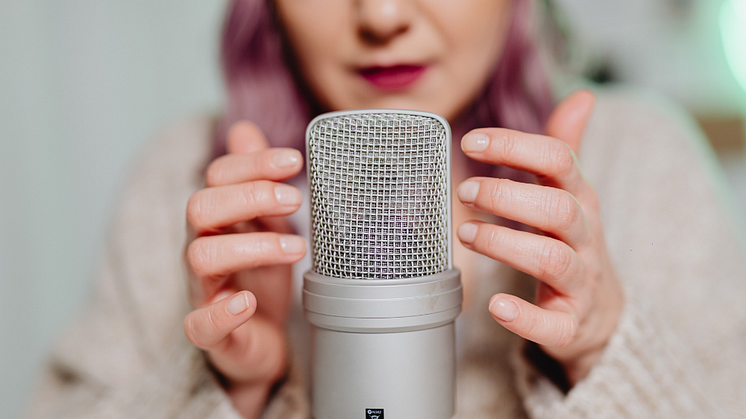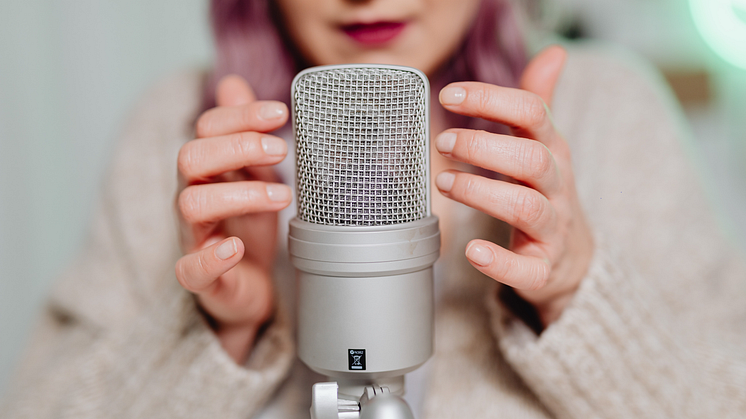
Press release -
Anxiety and neuroticism linked to ability to experience ASMR
New research from Northumbria University suggests a link between personality traits and the ability to experience the relaxing sensory phenomenon known as ASMR. The findings also show that it reduces anxiety in those who experience the sensation.
A study has uncovered new evidence linking higher levels of the personality trait neuroticism and anxiety with the ability to experience a deeply relaxing sensation known as the Autonomous Sensory Meridian Response (ASMR). Northumbria University MSc Psychology graduate Charlotte Eid and psychologists at the University present these findings in the open-access journal PLOS ONE on February 2, 2022.
ASMR occurs involuntarily and those who experience it often describe it as a pleasant tingling sensation beginning in the head and neck that may spread throughout the body. Not everyone experiences this sensory phenomenon, and those who do may have different triggers for it; for instance, receiving a massage or listening to quiet sounds, such as whispering, tapping or crackling.
Recent years have seen the creation of millions of online videos featuring sounds and situations that may trigger ASMR, with many viewers reporting relaxing benefits.
Previous research has suggested that people capable of experiencing ASMR may have elevated levels of neuroticism – a personality trait typically defined as a tendency toward anxiety, depression, self-doubt, and other negative feelings. However, the precise link between ASMR and personality traits has been unclear.
To help clarify, Eid and colleagues asked 36 volunteers who experience ASMR and 28 non-experiencers to watch a video designed to trigger ASMR. The participants completed several questionnaires to evaluate their neuroticism, general tendency to experience anxiety, known as ‘trait anxiety’, and moment-to-moment anxiety, or ‘state anxiety’, before and after watching the video.
Statistical analysis of the participants’ responses found that ASMR experiencers had higher levels of neuroticism and trait anxiety, as well as higher levels of state anxiety before watching the video — however, this type of anxiety was reduced after the video, and ASMR experiencers reported a greater level of benefit from the video. In contrast, non-experiencers did not undergo a reduction in state anxiety after watching the video.
Further analysis also suggested that the overall levels of neuroticism and anxiety statistically accounted for the observed difference in the pre- and post-video change in anxiety. This highlights the potential importance of these personality traits and indicates that if individuals are highly neurotic or anxious in general, they may benefit from ASMR videos even if they do not experience the tingling sensation.
Overall, these findings suggest that ASMR experiencers may be characterised by greater levels of neuroticism as well as anxiety disorders than non-experiencers. The results also suggest that ASMR could serve as an anxiety treatment for individuals with elevated levels of neuroticism or anxiety in general. However, the authors note, further research is needed to address the limitations of this study and enhance understanding.
Charlotte Eid, who led on the research as part of her MSc Psychology degree at Northumbria, said: “As an experiencer of ASMR myself, I was very interested in its potential benefits for people with anxiety. It is also evident within the community that a lot of viewers watch AMSR specifically for this reason, with many videos being themes around anxiety relief. Based on our results, if you suffer from anxiety it is definitely worth checking if you can experience ASMR. It is a free, accessible way to relax.”
Dr Joanna Greer, Senior Lecturer in Psychology at Northumbria University and Eid’s academic supervisor at the time of the research, said: “As Charlotte's thesis supervisor, it has been very rewarding to see her personal interest in ASMR develop into this research project, and which has now been published in PLOS ONE.
“I am delighted that the anxiety relieving benefits of ASMR reported anecdotally by experiencers has been supported empirically in this study. Whilst research interest in ASMR is growing, there is still much we do not know about the phenomenon. Our results have paved the way for more research investigating ASMR from a clinical perspective.”
A full copy of the paper, entitled ‘Untangling the tingle: Investigating the association between the Autonomous Sensory Meridian Response (ASMR), neuroticism, and trait & state anxiety’ can be found in the open-access journal PLOS ONE.
Northumbria University’s Department of Psychology has a well-established and thriving community of internationally recognised academics producing world-class research in areas including neuroscience, language comprehension, working memory, sleep, health and wellbeing, digital communication and nutritional interventions.
Adapted from a press release by PLOS ONE.
Notes to editors:
A full copy of the paper, entitled ‘Untangling the tingle: Investigating the association between the Autonomous Sensory Meridian Response (ASMR), neuroticism, and trait & state anxiety’ can be found in the open-access journal PLOS ONE via this link: https://journals.plos.org/plosone/article?id=10.1371/journal.pone.0262668
(DOI: https://doi.org/10.1371/journal.pone.0262668)
Topics
Categories
Northumbria is a research-intensive modern university with a global reputation for academic excellence. Find out more about us at www.northumbria.ac.uk --- Please contact our Media and Communications team at media.communications@northumbria.ac.uk with any media enquiries or interview requests ---











